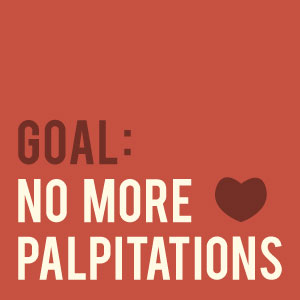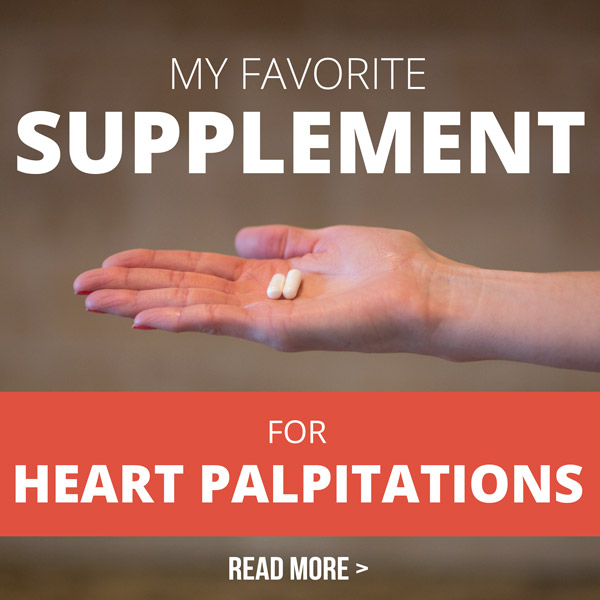[Note: This post is part of a larger series about the The Best Cures and Remedies for Heart Palpitations]
I think one of the first things that my doctor asked me about when I started having heart palpitations (you can read my story HERE) was if I had been running a lot or felt dehydrated in any way. The reason was because having an electrolyte imbalance is a very common cause of heart palpitations. It’s generally the first thing listed in articles online about the causes of palpitations.

What are the electrolytes?
When I hear the word electrolytes I think of sports drinks like Gatorade that supposedly replenish electrolytes for athletes. I also assumed that if a person was low on electrolytes that it generally meant that they needed more potassium or sodium (just eat a banana, right?). I didn’t realize that it also includes elements like chloride, calcium, sulfate, phosphate, bicarbonate, and magnesium. These electrically charged ions are critical to muscle function (including the heart). The electrical impulse they create help contract the heart and keep it pumping at a normal rate and speed, so If there is an issue with the body’s electrical system then it can cause slower beats, skipped beat, fast beats, etc.
What are the symptoms of Electrolyte imbalance?
As mentioned above, one symptom can be heart palpitations, but other things to look out for are muscle twitches, muscle spasms, headaches, anxiety, and restlessness. It can look different for everyone, so I would suggest checking out a full list of possible electrolyte imbalance symptoms if you are worried that you have an imbalance.
So How do you find the right balance of electrolytes?
I think then best place to start is your diet. Everything needs to be in moderation, especially products that are high in sodium. It’s shocking how much sodium can be in foods. If you are worried that you have heart palpitations caused by an electrolyte imbalance you should let your doctor/cardiologist know and it may be good to get blood work/urine sample done and see exactly where your levels are at.
I personally think that even small imbalances in electrolytes can keep your heart palpitating. So something like anxiety, stress, lack of sleep, or dehydration can knock your heart off rhythm, but small imbalances in your body’s electrical system can keep the skipped beats coming. That is one reason why our diet is so important in fighting heart palpitations. A good diet can lower stress, help you sleep better, keep you hydrated, and balance your electrolytes. During the worst days of my constant heart palpitations, I kept a food journal and it was incredibly helpful (I used myfitnesspal and highly recommend it). Honestly, my diet has never been the same since. I learned a ton about what I was putting in my body and I think it went a long way to helping reduce my heart palpitations and get back to a sense of normalcy.
What about Supplements for Electrolytes?
There are definitely supplements that can help with an electrolyte deficiency. I’ve tried a few (some good ones seem to be LyteShow, Ultima Replenisher), and I wrote about the importance of magnesium before HERE. There are benefits to taking them if you feel like you need them. But I would still start with your diet first. The last thing you want to do is take too much of a particular supplement and swing the imbalance of electrotypes from one element to another, especially potassium which can be very detrimental to heart rhythm if taken in excess. So be sure to talk to your doctor and make sure you establish a plan that is right for you and your particular situation.
It’s also a good idea to stay hydrated when you are out in the heat or exercising. I love to run and cycle, but down here in the Southwest it is easy to get dehydrated quickly. I occasionally drink the regular sports drinks, but there is so much sugar in them that I try to find other alternatives like Vitamin water or coconut water (with added sodium), and nuun tablets.
So what about you? Do you think an electrolyte imbalance has caused your heart palpitations? What do you do to keep things in balance?





That is exactly what caused my heart palpitations! For three months I had heart palps non stop. I went to a well known cardiologist who is also a researcher. I’m from Texas and he is a big deal here. He had me wear a holter monitor for a week and told me I was having an average of 7000 palps a day which was very concerning and could cause long term damage to my heart if let it continue. He did a blood test on me and noticed my potassium was low. So he gave me a prescription for potassium and he recommended that I go to the health food store and buy calcium carbonate and magnesium chelate. (It had to be chelate and carbonate for it to work) He said that after taking these three minerals for one month that they should be gone. I almost didn’t believe him but after one month and one week they were gone. When I started having palps it was after having a baby and I was very stressed out, probably the most stressed I’ve ever been in my life. I was also drinking a lot of coffee and very little water and breastfeeding! I’m writing this in hopes that it’ll help someone.
Who is the cardiologist? I’m in Texas also
Dr Peter McCullough in Dallas, he’s brilliant.
Thank you! Are you still free of palps?
Every now and then I will feel one. Usually when I’m stressed or dehydrated. When I’m dehydrated I drink coconut water and they usually go away. Not stressing helps so much though, when I didn’t know what was causing them I would really stress out and I think it would make me have more. Hope this helps you.
yes thanks! I have started with ConcenTrace drops just a few days ago. Have been looking for a good cardio in DFW, since mine retired, and I think this one sounds promising! Mine seems to be tied to anxiety and over-working.
Dear Tom:
Wow, thank you so much for creating this website! This just shows that there are still good, selfless people in the world who make it a better place. I think you are absolutely right about electrolytes, and I’m going to take your advice right now. I have been bothered with palpitations for the last 24 years, and they got much worse after each pregnancy. I have three kids to take care of, and they need me, Doctors couldn’t find anything wrong with my heart, but they weren’t thinking about electrolytes. Thank you, thank you!
Hi Everybody. It’s great to talk to people who know the same fears that come along with the palpitations. I’ve been on ditalizam for a few years. Recently I stopped taking it because it seemed like when I took it they would happen more often. My doctor tried me on Metoprolol which I couldn’t tolerate. Ever since I tried the Metoprolol I have been feeling waves of dizziness all the time and just really weird. Still having palpitations off and on. Doctor told me to take Magnesium Oxide so am trying that. I am afraid that I am not going to wake up so having trouble sleeping. I am not usually a paranoid person, not sick much at all but this is just freaking me out.
Quitting coke helped me. Eating one banana a day helped (especially before my periods when they are worse). Limiting tea to no more than one a day. Coconut water also helped. This information is helpful – thank you to the writer.
None of these things work for me. My palpitations have some connection to low heart rate and lack of water. I am dieting and though I think it am eating ok, I got a non-fasting gluclose blood test recently which was 79. Low. I started to wonder if low blood sugar could lead to low heart rate and palps and indeed it does. This might also explain why the palps seem to come on after 2 PM as your blood sugar naturally rises in the morning. I believe what could be happening is that I don’t have a ton of glycogen stores. In the morning I drink coffee the liver releases the little glycogen stores I have — giving me glucose. Then as the day goes on and I eat little carbs my blood sugar starts dropping. Glycogen stores also have a lot of water. One reason you lose water weight when you start dieting. I have to drink a ton of water to stave off palps but that might be because I go to the bathroom almost as much as I eat. Without glycogen there is nothing to “hold it in”. I recently read that Atkins is now recommending broth be taken per day with a low carb diet. I am guess that is for both water and salt to keep the water from just being eliminated. I am trying it out but I ate about 100gs of carbs today and my resting heart rate is higher.